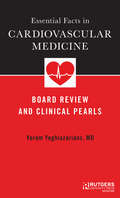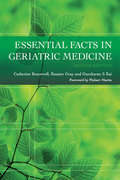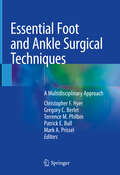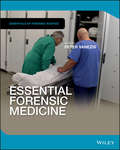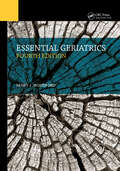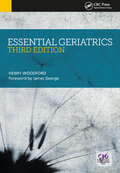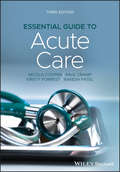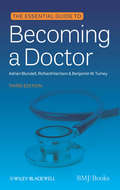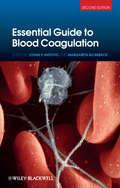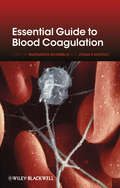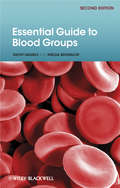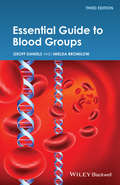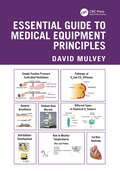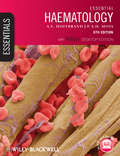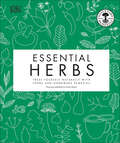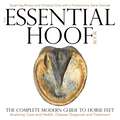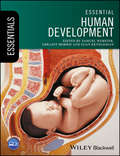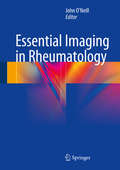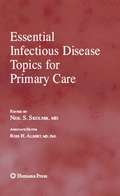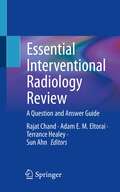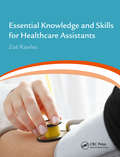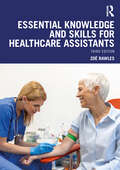- Table View
- List View
Essential Equations for Anaesthesia
by Edward Gilbert-Kawai Marc WittenbergA sound knowledge of equations and their use, derivation and clinical application is an absolute prerequisite for any anaesthetist. As a result, equations are a favourite question topic of examiners, particularly in the viva examinations. Many candidates answer these poorly, losing valuable marks and floundering when they face what they perceive as "nightmare" questions. This book provides a simple, portable, reference guide to all the equations that candidates may be asked about during their examinations. The content is split into four sections; physics, pharmacology, physiology and statistics. Each equation is clearly explained, derived where necessary, and placed into a clinical context using a worked or clinically relevant example to demonstrate its use. Units and relevant terms are given and where required, clear, concise diagrams have also been provided to simplify understanding. Written by anaesthetic trainees, this is an essential resource for preparation for the FRCA, EDA and other anaesthetic examinations.
Essential Evidence-Based Psychopharmacology
by Stephen M. Stahl Dan J. Stein Bernard LererThis volume presents up-to-date, comprehensive and high quality reviews of the psychopharmacological evidence-base for each of the major psychiatric disorders, written by expert psychopharmacologists from around the world. Building on the success of the first edition, the volume summarizes the wealth of new developments in the field and sets them within the context of day-to-day clinical practice. All chapters have been fully updated and new contributions on personality disorders and substance dependence added. Each chapter provides information about optimal first line pharmacological interventions, maintenance pharmacotherapy and the management of treatment-refractory patients. The content is organized according to the DSM-V listing of psychiatric disorders, and covers all major conditions including schizophrenia, mood disorders, anxiety disorders, eating disorders and Alzheimer's disorder. These issues lie at the heart of clinical psychopharmacology, making this book invaluable to all practising and trainee clinicians, in a mental health setting or a less specialized environment.
Essential Facts in Cardiovascular Medicine: Board Review and Clinical Pearls
by Dr Yerem YeghiazariansThe treatment and management of cardiovascular disease has seen rapid advances in recent years; as a trainee or practitioner of cardiovascular medicine, it can be difficult to find the time to stay abreast of recent updates in information. Unlike standard exhaustive text and reference titles, Essential Facts in Cardiovascular Medicine provides the most critical facts and clinical pearls of cardiovascular medicine, in a high-yield, concise, bulleted format that can fit in your pocket. Essential Facts in Cardiovascular Medicine is the perfect guide to enhance your cardiovascular knowledge, prepare for board examinations, and improve clinical practice. Essential Facts in Cardiovascular Medicine covers numerous important topics from the basics of Statistics, to factoids in General Cardiology, Physical Exam, EKG, Congenital Heart Disease, Valvular Heart Disease, Heart Failure/Transplant, Acute Coronary Syndromes, Pericardial Diseases, Electrophysiology, Pharmacology, Pregnancy, Pulmonary Hypertension, Peripheral Vascular Disease, Echocardiography, Formulas, Interventional Cardiology and Cardiac Tumors.
Essential Facts in Geriatric Medicine
by Catherine Bracewell Rosaire GrayAlready established in its first edition as a key text in elderly care, this comprehensively revised second edition of Essential Facts in Geriatric Medicine is a vital reference for health professionals involved in providing comprehensive care to the older population. The book thoroughly explores clinical aspects, as well as demographic, statistica
Essential Foot and Ankle Surgical Techniques: A Multidisciplinary Approach
by Terrence M. Philbin Gregory C. Berlet Christopher F. Hyer Mark A. Prissel Patrick E. BullThis comprehensive textbook brings together a unique vision and multidisciplinary approach – embracing and combining MD, DO and DPM foot and ankle training disciplines – into a singular focus on improving and mastering surgical treatment of foot and ankle disorders. It opens with a chapter presenting the specific preoperative considerations and protocols commonly followed by foot and ankle surgeons of all specialties. Divided into three main thematic sections detailing the forefoot, midfoot and hindfoot, each subsequent chapter follows a consistent chapter format presenting case examples, key surgical set-up and equipment needs and step-by-step clinical pearls for surgical excellence. Post-operative care and rehabilitation recommendations are also included for a well-rounded presentation of care from start to finish. Both common and complex pathologies and injuries are discussed, from bunion and hammertoe management to the Charcot foot and ankle, total ankle replacement, arthroscopy and arthroplasty techniques, amputations and biologics. Generous figures and intraoperative photos illustrate the procedures in vivid detail.The subspecialty of foot and ankle surgery is a highly specialized one, which is constantly evolving and improving. This speaks to the complexity of the foot and ankle complex, the multiple levels and articulations of the foot and the variety of pathologies encountered. This textbook leans on the unique experience and training of the OFAC attending surgeons and past fellows to reveal the pearls and keys to the efficient surgical treatment of the full gamut of foot and ankle pathologies. Ideally suited for residents and students whether MD, DO or DPM, Essential Foot and Ankle Surgical Techniques - EFAST for short - is a dynamic, multidisciplinary resource that covers the full range of pathologies and injuries an orthopedic surgeon or podiatrist would encounter in daily practice.
Essential Forensic Medicine (Essentials of Forensic Science)
by Peter VanezisProvides an invaluable distillation of key topics in forensic medicine for undergraduate, masters, and postgraduate students Essential Forensic Medicine covers the broad area of the forensic medical sciences, delivering core knowledge in the biomedical sciences, and the law and ethics surrounding them. Concise, accessible chapters cover a wide range of topics from basic forensic identification and examination techniques to forensic toxicology and psychiatry. Written by internationally-recognized experts in the field, this authoritative guide offers complete chapter coverage of the legal system, courts, and witnesses; investigation of the deceased and their lawful disposal; and the duties of a registered medical practitioner and the General Medical Council. It instructs readers on the general principles of scene examination and the medico-legal autopsy including how to interpret the many kinds of injuries one can suffer—including those from blunt impact and sharp force, firearms and explosives, asphyxia and drowning. Further chapters cover sexual offences, child abuse, and using DNA in human identification, mental health, alcohol and drug abuse. A fresh, accessible, up to date textbook on forensic medicine Written by a well-known experts with decades of experience in the field Includes numerous figures and tables, and detailed lists of key information Features numerous case studies to reinforce key concepts and ideas explored within the book Helps students to prepare for examinations and enables practitioners to broaden their understanding of the discipline Part of the “Essential Forensic Science” series, Essential Forensic Medicine is a highly useful guide for advanced undergraduate students, master’s students, and new practitioners to the field.
Essential Geriatrics
by Henry WoodfordIn an ageing society, developing high-quality healthcare for older people becomes increasingly important. This revised and updated fourth edition focuses on the key aspects of ageing and healthcare for older people, especially those with moderate to severe frailty. It has expanded sections on the key topics of frailty and medicines optimisation with evidence from critically appraised clinical trials formulated into practical guidance for management. It details the non-pharmacological management of cognitive disorders and models of person-centred care. Additional topics of acute coronary syndromes and COVID-19 have also been added in this comprehensive text for healthcare professionals. Key Features Provides practical therapeutic advice including deprescribing decisions for all medication types. Presents statistics in more clinically meaningful ways – i.e. number needed to treat and no p-values, to aid the process of shared decision-making for clinicians and professionals. Includes 200 revised questions and answers throughout the text in the 'best of five' format suitable for the SCE and similar higher-training exams.
Essential Geriatrics, Third Edition (Radcliffe Ser.)
by Woodford HenryThis third edition of Essential Geriatrics has been comprehensively updated and expanded, and now includes over 200 questions and answers throughout the text in the 'best of five' format. This text specifically focuses on the key aspects of elderly care, spanning both general medicine and the particular problems encountered in geriatrics as a
Essential Guide to Acute Care
by Kirsty Forrest Nicola Cooper Rakesh Patel Paul CrampWhat you really need to know, but no-one told you. The best-selling Essential Guide to Acute Care contains everything you need to know about acute care that you can’t find in a standard textbook. The third edition has been extensively revised and updated, presenting new oxygen guidelines, updated evidence and practice around sepsis, fluid balance and volume resuscitation, acute kidney injury, perioperative care, and much more. The third edition retains the accessible style and comprehensive coverage that has made Essential Guide to Acute Care essential reading for those who look after acutely ill adults. Throughout the book, ‘mini-tutorials’ expand on the latest thinking or controversies, and there are practical case histories to reinforce learning at the end of each chapter. The chapters are designed to be read by individuals or used for teaching material in tutorials. This new edition of Essential Guide to Acute Care: Provides up-to-date and practical guidance on the principles of acute care, written by experienced teachers and clinicians Offers a unique approach to the subject that focuses on understanding rather than lists and ‘recipes’ Explains the altered physiology that accompanies acute illness in adults Includes learning objectives, self-assessment questions, and illustrative examples related to clinical practice Essential Guide to Acute Care is an indispensable volume for medical students and newly graduated doctors; doctors training in medicine, surgery, anaesthesia and emergency medicine; advanced clinical practitioners; nurses and allied health professionals working in acute and critical care; and teachers.
Essential Guide to Becoming a Doctor
by Richard Harrison Adrian Blundell Benjamin W. TurneyAll you need to know about becoming a doctor in the UKThis book contains all the help you need to become a doctor. From applying to medical school through to choosing your specialty, you can find out: How to choose a medical schoolHow to get into medical schoolHow to survive as a medical studentAll about electivesWhat life is like as a doctorAs well as easy to follow information on choosing, getting into - and surviving - medical school, junior doctors in different specialties provide unique insight with firsthand accounts of what the job is like in real life, to help you plan and decide your future career path. Included in this fully updated third edition is the latest information on admission tests, an admission table with practical details about each medical school (as well as greater coverage of graduate medical schools), making this now even more comprehensive for everyone planning a career in medicine.
Essential Guide to Blood Coagulation
by Margareta Blombäck Jovan P. AntovicA practical guide to laboratory diagnosis and treatment of hemostatic disorders.This concise book distils the most clinically up-to-date information on thrombotic and bleeding disorders, including the latest treatment strategies, for key conditions and diseases. Essential Guide to Blood Coagulation covers both the stable and the acute stages of hereditary and acquired bleeding and thrombotic disorders. Faced with a bleeding patient, it may be difficult to determine whether blood loss is due to a local factor, or an underlying hemostatic defect. There are a range of laboratory tests which can be performed to identify the cause of bleeding in a patient. This book highlights the tests that can be used in the laboratory to aid diagnosis. Essential Guide to Blood Coagulation has been updated to include the new anticoagulants and now has a dedicated chapter on antiplatelet drugs. This invaluable guide will help all those treating patients to expand their knowledge of hemostatic disorders. TITLES OF RELATED INTEREST Hemophilia and Hemostasis: A Case-Based Approach to ManagementSecond EditionAlice Ma, Harold Roberts, Miguel EscobarISBN: 978-0-470-65976-2 Quality in Laboratory Hemostasis and ThrombosisSecond EditionSteve Kitchen, John Olson, Eric Preston (due May 2013)ISBN: 978-0-470-67119-1
Essential Guide to Blood Coagulation
by Margareta Blombäck Jovan P. AntovicA practical guide to laboratory diagnosis and treatment of hemostatic disorders. This concise book covers all you need to know to manage thrombotic and bleeding disorders, distilling the most clinically up-to-date information, and including the latest treatment strategies for key conditions and diseases. Essential Guide to Blood Coagulation covers both the stable and the acute stages of hereditary and acquired bleeding and thrombotic disorders. Faced with a bleeding patient, it may be difficult to determine whether blood loss is due to a local factor or an underlying hemostatic defect. There are a range of laboratory tests which can be performed to identify the cause of bleeding in a patient. This book highlights the tests that can be used in the laboratory to aid diagnosis. Originally published in Swedish, Essential Guide to Blood Coagulation, has been revised to include the latest treatment strategies available for patients and will help clinicians to expand their knowledge of hemostatic disorders.
Essential Guide to Blood Groups
by Geoff Daniels Imelda BromilowA short, up-to-date text on blood groups, for people working or training in the field of blood transfusion, transplantation, or human genetics, but who are not specialising in the field of blood groups, the third edition of Essential Guide to Blood Groups is a pocket-sized book, containing full colour text together with schematic figures and tables. The book comprises an introduction to blood groups, followed by chapters on techniques, information on various blood groups, antibodies, quality assurance in immunohaematology, and it concludes with chapters on troubleshooting in the laboratory, and FAQs. It also covers the serology, inheritance, biochemistry and molecular genetics of the most important blood group systems.
Essential Guide to Blood Groups
by Geoff Daniels Imelda BromilowEssential Guide to Blood Groups is the only pocket sized guide to provide essential information on blood group systems. The main aim of the blood transfusion laboratory is to promote safe blood transfusion. The avoidance of errors, from sample receipt and laboratory testing through to the release of blood for transfusion, is of paramount importance. Knowledge of immunohaematology theory and its application to blood transfusion together with the principles of good laboratory practice are essential. This handbook helps to address these important issues and also covers: • the serology, inheritance, biochemistry, and molecular genetics of the most important blood group systems • their clinical importance • techniques used in blood grouping, troubleshooting, and quality assurance This unique and practical guide: • is written by leaders in the field, including the author of the best seller Human Blood Groups • provides the basic knowledge of blood groups needed by all those working in the important fields of transfusion medicine and science. • helps in resolving commonly encountered problems Essential Guide to Blood Groups will be valuable for undergraduate medical laboratory scientists and for postgraduate scientists and medical practitioners training to specialise in transfusion and transplantation. As a pocket edition, it will also be a useful addition to other reference works on blood groups for quick access to information for medical practitioners and in red cell immunohaematology laboratories.
Essential Guide to Medical Equipment Principles
by David MulveyThis book addresses the needs of new clinical engineers, junior nurses, medics and operating department practitioners (ODPs) with regard to the fundamentals of many of the standard medical devices they will encounter in a hospital environment. The book can be used for both self-directed learning and also in a classroom environment as a textbook.Essential Guide to Medical Equipment Principles introduces and provides the principles behind many of the common medical devices and equipment used within a modern hospital. Each of the seven chapters is designed to cover a particular type of medical device such as mechanical ventilators along with the physiology that must be understood in order to make sense of their application and engineering concepts. This fundamental knowledge will enable the reader to progress further in the years to come. The author uses diagrams throughout the book to allow the reader to get the most from the text and ensure that the most essential information is understood. It offers a comprehensive understanding of the physiological and engineering principles underlying medical equipment.This book is intended for new technicians and engineers entering the clinical engineering field but can also be a valuable resource for a broader range of healthcare professionals, including operating department practitioners, neonatal unit practitioners, intensive care unit practitioners and other medical equipment users. With suppliers, manufacturers and in-hospital training, it will enable them to become safe and competent in the use and application of medical devices and equipment.
Essential Haematology
by A. V. HoffbrandEssential Haematology is established as the most authoritative introduction to haematology. Beautifully presented, it introduces the formation and function of blood cells and diseases that arise from dysfunction and disruption of these processes. Basic science, diagnostic tests, clinical features and management are all clearly explained. The book outlines the basic principles of clinical and laboratory haematology and shows how manifestations of blood diseases can be explained by new knowledge of the disease processes. For the first time, Essential Haematology is fully supported by a suite of online MCQs and answers, and is now available as a FREE enhanced Wiley Desktop Edition (upon purchase of the book). Thoroughly updated to reflect the latest research in this fast-moving field Contains summary boxes at the end of each chapter Includes an expanded treatment range and an expanded section on bone marrow failure and transplantation Includes a companion website at www. wiley. com/go/essentialhaematology featuring figures and tables from the book for downloading, and interactive multiple choice questions prepared by the authors
Essential Health Benefits
by Cheryl UlmerIn 2010, an estimated 50 million people were uninsured in the United States. A portion of the uninsured reflects unemployment rates; however, this rate is primarily a reflection of the fact that when most health plans meet an individual's needs, most times, those health plans are not affordable. Research shows that people without health insurance are more likely to experience financial burdens associated with the utilization of health care services. But even among the insured, underinsurance has emerged as a barrier to care. The Patient Protection and Affordable Care Act (ACA) has made the most comprehensive changes to the provision of health insurance since the development of Medicare and Medicaid by requiring all Americans to have health insurance by 2016. An estimated 30 million individuals who would otherwise be uninsured are expected to obtain insurance through the private health insurance market or state expansion of Medicaid programs. The success of the ACA depends on the design of the essential health benefits (EHB) package and its affordability. Essential Health Benefits recommends a process for defining, monitoring, and updating the EHB package. The book is of value to Assistant Secretary for Planning and Evaluation (ASPE) and other U. S. Department of Health and Human Services agencies, state insurance agencies, Congress, state governors, health care providers, and consumer advocates.
Essential Herbs: Treat Yourself Naturally with Herbs and Homemade Remedies
by Neal's Yard RemediesFind your route to natural wellness with Neal's Yard Remedies' expert guide to using medicinal herbs.Essential Herbs offers expert advice and know-how you can trust in this detailed guide, which features an illustrated directory of 100 key herbs, including hemp, lavender, thyme, aloe vera, and lemongrass. Discover the treatment potential for each plant, and how you can prepare and use them to best effect.Alongside the directory, the book features more than 70 recipes designed to heal the body from the inside out, all of which can be prepared in your own kitchen. Try a fennel and chamomile tea to aid digestion, a cranberry and apricot power bar to boost energy levels, or a beeswax and calendula balm to combat stretch marks.With this easy-to-use treatment guides to help you find the herbs you need at a glance, Essential Herbs is a comprehensive guide to staying healthy the natural way.
Essential Hoof Book
by Susan Kauffmann Cline ChristinaThe equine hoof is a complex marvel of natural engineering, built to withstand tremendous forces and able to adapt to an astonishing range of environmental conditions. It also changes daily–for better or for worse–in response to external and internal factors. Few horse owners have the opportunity to acquire a deep understanding of the hoof, which limits their ability to advocate on their horses&’ behalf and make informed decisions about hoof care and management. This book is the first resource of its kind to combine the most current and useful information available, gleaned from the research and wisdom of top hoof experts around the world, with a unique &“hands-on&” approach. The authors provide basic terms and anatomy, clearly illustrate the differences between healthy and unhealthy feet, discuss biomechanics and management concerns, and cover the causes, treatments, and prevention of commonly encountered problems, including laminitis, white line disease, and thrush. Along the way, readers are given activities to help them better analyze and understand the most important aspects of equine hoof health, such as hoof balance, depth of sole, and point of breakover. Easy–to–follow language, over 400 full–color photographs, and do–it–yourself exercises promise to empower horse owners and caretakers of all experience levels with the tools they need to accurately assess hoof health and keep their horses as sound and happy as possible.
Essential Human Development (Essentials)
by Samuel Webster Geraint Morris Euan KevelighanAs our understanding of the human body broadens, so does the need for a comprehensive text that encompasses all aspects of human development. Essential Human Development is a great course companion that focuses on the human life cycle, ideal for the undergraduate student new to these fields, or for qualified practitioners looking for a reference guide. Featuring key information points and self-test assessments in each chapter, the book is organised in an accessible manner, beginning with fertilisation and embryology, then moving on to obstetric medicine, neonatal care and child health, with the final section exploring gynaecological medicine. Ensuring that information is placed in context to aid understanding, Essential Human Development is the perfect support for the modern medical school curriculum, as well as a vital reminder of the core information needed whilst on a women or child health clinical placement.
Essential Imaging in Rheumatology
by John O'NeillEssentials of Rheumatology Imaging covers all current methods of imaging and imaging techniques related to common rheumatic symptoms and specific rheumatic diseases. This book presents comprehensive, high resolution images necessary for the diagnosis of diseases of the soft tissues, connective tissues and joints, including rheumatoid arthritis, gout, Lupus, Sjögren's syndrome, osteoarthritis and scleroderma. A concise reference source for radiologists, Essentials of Rheumatology Imaging delivers up-to-date and complete information on the imaging of rheumatic disease.
Essential Infectious Disease Topics for Primary Care
by Ross H. Albert Neil S. SkolnikThis book provides an easy to use, practical, yet comprehensive resource for family practitioners to use in the daily struggle against infectious diseases. It discusses vaccines and preventive measures as well as information on how to reduce the incidence of antimicrobial-resistant organisms by judiciously prescribing antibiotics and informing patients about the appropriate use of these agents. This up-to-date overview is a one stop source for evidence-based guidelines.
Essential Interventional Radiology Review: A Question and Answer Guide
by Adam E. M. Eltorai Rajat Chand Terrance Healey Sun AhnThe book is a question-and-answer guide to interventional radiology. This pocket resource addresses both general IR and subspecialty topics, providing accurate, on-the-spot answers. Students can read the text from cover to cover to gain a general foundation of knowledge that can be built upon when they begin their rotation or use specific chapters to review a subspecialty before starting a new rotation or joining a new service. The book begins with a general introduction to IR and its common procedures and tools, and is then organized by subspecialties (like vascular disease, oncology, and genitourinary), focusing on common conditions. The book’s two-column format provides questions on the left and answers on the right to facilitate rapid-fire review that includes many classic images to facilitate pattern recognition skills. This book is an ideal, on-the-spot reference for medical students, residents, and practicing interventional radiologists seeking fast facts on diagnosis and treatment with interventional radiology.
Essential Knowledge and Skills for Healthcare Assistants
by Zoe Rawles Zoë RawlesCovering all the essential components of healthcare assistant and assistant practitioner roles, Essential Knowledge and Skills for Healthcare Assistants is a practical and comprehensive text designed to equip you with the necessary clinical skills for your profession. This book: Equips you with the knowledge to provide the safest and most effective patient care possible Provides evidence-based guidelines to ensure best practice that is matched to the National Occupational Standards Supplies comprehensive coverage of both primary and secondary care settings with an emphasis on the role in primary care Includes information on accountability, communication skills, confidentiality and reflection Uses a light-hearted and accessible style, with definitions, case studies and activities to aid understanding Includes a Foreword written by Tanis Hand, HCA adviser at the Royal College of Nursing This is an indispensable guide for all those training as healthcare assistants and assistant practitioners, as well as a useful reference for students embarking on a degree in nursing or health and social care.
Essential Knowledge and Skills for Healthcare Assistants
by Zoë RawlesThis revised edition of Essential Knowledge and Skills for Healthcare Assistants is an accessible and comprehensive text designed to equip you with the necessary skills for your practice. This book equips you with the knowledge to provide the safest and most effective patient care possible and supplies comprehensive coverage of both primary and secondary care settings, with an emphasis on primary care. It provides evidence-based guidelines to ensure best practice that is matched to the National Occupational Standards, the Care Certificate and the qualification frameworks from around the United Kingdom (UK).The third edition includes the following:• an all-new chapter on safeguarding and expanded coverage on communication skills;• a comprehensive overview of the principal clinical skills that healthcare assistants (HCAs) need to master, including understanding physiological measurements, taking blood pressure, venepuncture, urinalysis, wound care, administering injections, and more;• essential non-clinical knowledge and skills such as communication and assertiveness, reflection, accountability, confidentiality and recordkeeping, health promotion, infection control, and more;• the evolving role of the healthcare assistant and training opportunities; and• application to practice throughout, with numerous case studies and activities to aid understanding.This is an essential guide for all those training as healthcare assistants, nursing associates and assistant practitioners, and a useful reference for students embarking on nursing, and health and social care programmes.

